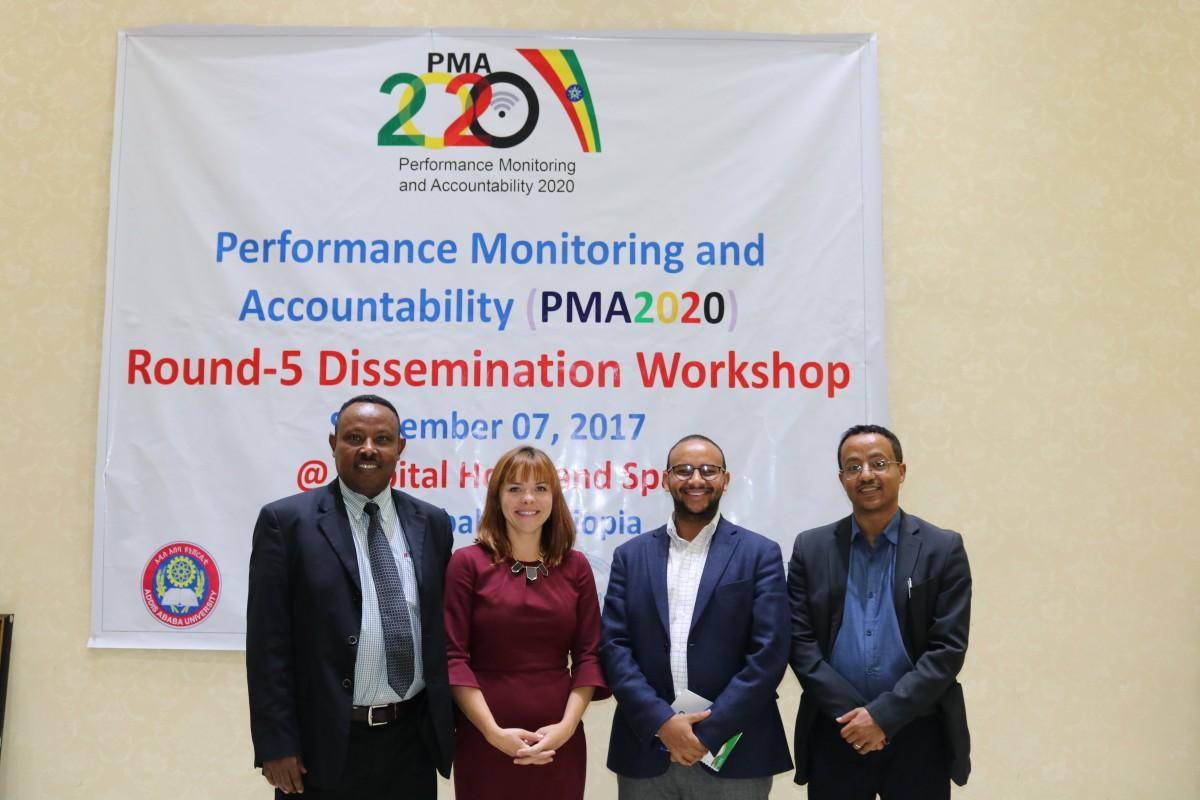Photograph (left to right): Dr. Assefa Seme (Co-PI, PMA2020/Ethiopia), Dr. Linnea Zimmerman (Associate Director for Research, PMA2020), Dr. Ephrem Lemango (Director of Maternal, Child Health and Nutrition Directorate of the Ministry of Health in Ethiopia), Dr. Solomon Shiferaw (PI, PMA2020/Ethiopia)
Data from the fifth and most recent round of the Performance Monitoring and Accountability 2020 (PMA2020) survey in Ethiopia show an increasing proportion of women, married, unmarried, and all, are using highly effective, long-acting forms of contraception, such as implants, intrauterine devices (IUDs), and to a lesser degree sterilization. Over the past three and a half years (since PMA2020’s first survey round in 2014), Ethiopia has made strides in improving family planning access and use among both married and unmarried women. More women are using contraception, they are using contraception at an earlier age, and they are increasingly choosing the most-effective long-acting methods.
The PMA2020 survey has been able to detect the growing popularity of implants and IUDs in Ethiopia. The proportion of married women choosing long-acting methods increased almost 10 percentage points in three years, from 18.2% in 2014 to 27.7% in 2017. The contraceptive implant saw an especially large jump in popularity in all groups. Married women using implants has increased from 15.9% to 23.7% from 2014 to 2017.
Researchers at the Addis Ababa University’s School of Public Health at the College of Health Sciences (AAU/SPH/CHS) held a national data dissemination event on September 7, 2017 to present new results from the PMA2020 annual family planning survey. Dr. Solomon Shiferaw, Principal Investigator for the PMA2020 program in Ethiopia, presented these and other key findings, highlighting trends in contraceptive use, implant removal, and adolescent health.
“We found that women are not only choosing to increase long-acting methods of family planning more often, but they also have better access to long-acting methods. Public sector facilities are offering a broader range of methods and are have the methods in stock,” explains Dr. Shiferaw.
Increased Access to Long-Acting Methods
The survey found that public sector facilities tend to offer a wide range of methods—spanning long-acting and short-acting methods, especially when compared to private facilities. Most public facilities provide implants, injectables, pills, and condoms. The findings noted however, only 67% of public facilities offer IUD, this is in stark contrast to injectables where almost 97% of public facilities offer this method. While not reaching the levels observed in public facilities, a large share of private facilities (ranging from 61% for injectables to 90% for pills) offer short-acting methods. Fewer private facilities (11% for IUDs and 13% for implants) offer long-acting methods. Women who seek longer-acting methods often must turn to the public health facilities.
In his closing remarks, Dr. Ephrem Lemango, Director of Maternal, Child Health and Nutrition Directorate of the Ministry of Health in Ethiopia and keynote speaker for the dissemination event, stated, "I’ve never said it before, but in terms of accessibility and quality, PMA2020 is the best data we have."
---
PMA2020 uses innovative mobile technology to support low-cost, rapid-turnaround surveys to monitor key family planning and other health and development indicators on an annual basis. The program is implemented by local university and research organizations in 11 countries, deploying a cadre of female resident data collectors trained in mobile data collection. In Ethiopia, PMA2020/Ethiopia is led by Addis Ababa University’s School of Public Health at the College of Health Sciences (AAU/SPH/CHS), in collaboration with regional universities, the Federal Ministry of Health and Central Statistical Agency. Overall direction and support is provided by the Bill & Melinda Gates Institute for Population and Reproductive Health at the Johns Hopkins Bloomberg School of Public Health and funded by the Bill & Melinda Gates Foundation.
For this survey round, a new set of 221 enumeration areas (EAs) were selected, adjacent to EAs used in the previous four rounds, drawn by the Central Statistical Agency from its master sampling frame. For each EA, 35 households and 3-6 health service delivery points (SDPs) were selected. Households were systematically sampled using random selection. Households with eligible females of reproductive age (15-49 years) were contacted and consented for interviews. The final sample included 7,616 households, 7,361 de facto females and 452 SDPs (98.9%, 98.7% and 97.8% response rates respectively). Data collection was conducted between April and May 2017.
